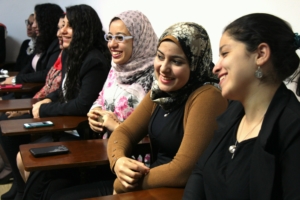Female Entrepreneurship and Empowerment in the Middle East and North Africa (MENA) Region

Photo by USAID/CGutierrez
The average share of women-owned small and medium enterprises (SMEs) is 34 percent globally, but only 14 percent in the MENA region.[1] The labor force participation rate among females in MENA aged 15+ is only 20 percent[2] and despite a 73 percent literacy rate among adult women,[3] women have the lowest rates of Total Entrepreneurial Activity (TEA).[4] Access to finance for female entrepreneurs is a critical component to this reality. The credit gap is high in MENA and women frequently experience issues with gender biases, financial institutions’ perception of risk, the ability to provide adequate collateral, and unfavorable lending policies like high interest rates and short repayment periods. Enhanced female entrepreneurship and workforce participation creates a huge opportunity for growth, in the MENA Region and beyond. As stated in USAID’s 2018 Private Sector Engagement Policy, “Recent estimates suggest that closing the global gender gap in workforce participation by 25 percent by the year 2025 could grow the world’s Gross Domestic Product (GDP) by $5.3 trillion and generate increased tax revenues of up to $1.4 trillion . . . addressing the unmet financial needs of women-led businesses—a gap estimated at $260-$320 billion a year—represents an opportunity for women entrepreneurs, financial investors, families and communities, and the global economy.”[5]
On November 17, 2020, Integra hosted a virtual webinar on private sector engagement (PSE) for the USAID/Middle East Bureau titled “Female Entrepreneurship and Empowerment in the MENA Region.” The webinar, part of a monthly training series under the LEAP III contract, focused on the entrepreneurship and innovation ecosystem in MENA; the role USAID can take in building out this ecosystem; where efforts have come up short in the past; the role of venture capital, particularly from a MENA-centric point of view, and what needs to change to make venture capital critical to the development of the entrepreneurial ecosystem in MENA. The event was moderated by Allison Salyer, the Senior Women, Peace, and Security Advisor within the Bureau, and featured founders, co-founders, CEOs, COOs, and managing directors of five women-led businesses in the region.[6]
Currently, USAID supports female entrepreneurship and empowerment in the MENA region in many ways. These include, but are not limited to, capacity building events and workshops, collaboration with accelerators and incubators, and tools such as grants to support pilots and testing to demonstrate proof of concept for business models.
However, there is more that can be done to empower women in the MENA Region in the entrepreneurial space. Our panelists shared that common entrepreneurial concerns include not necessarily a lack of innovative ideas or appropriate skills—like how to register a business, develop a business plan, or market a product—but rather scaling and exporting of products, reaching new markets, improving supply chains, paying with hard currency internationally, and finding financing that is appropriate in size and structure, particularly once businesses have surpassed the startup phase. They noted that business mentors are readily available, even free and online in some places, but that financial and legal technical advisory is lacking and directly impacts the success or failure of a startup. De-regulation and modernization of the legal system would modernize the entrepreneurship ecosystem as well.
Multiple panelists also highlighted the value of networking, particularly for learning of new opportunities and fundraising. They shared that the vast majority of decision makers in investment organizations are men, and described difficulties building the appropriate relationships that are needed to build trust, camaraderie, and good-will. Although the culture in the region is maturing, male investors were characterized as often asking female entrepreneurs unique questions in comparison to their male counterparts, such as whether their marriage status would impact their ability to run the business. Greater impact can be realized by encouraging and supporting more female investors, and then connecting women-led businesses with these female investors.
Panelists also noted the importance of understanding the appropriate types of interventions for each entrepreneur, based on their unique background and growth stage. Time should be invested speaking with people on the ground to gain an understanding of the problems before designing an intervention. Implementers should keep an experimental mindset as well as reduce the number of capacity building events held, unless they are action-oriented. A female entrepreneurs’ time is valuable, and they need to spend as much time as possible growing their businesses.
Lastly, support to female entrepreneurs should include the development of a technology strategy for the business, as well as support for increased civic participation and advocacy. Job fairs, meet ups, and broadcasting of success stories and lessons learned are also incredibly helpful. Where possible, USAID should prioritize funding private sector organizations directly, rather than using governmental or other third-party entities.
Female entrepreneurship is important to spurring job creation and economic growth, bolstering growth and inclusion, increasing global trade, reducing poverty, and improving livelihoods. For example, the featured female entrepreneurs shared that their women-led businesses hired more female employees, included more women-led businesses in their supply chains, and increased income at the local level. Integra is excited to have the opportunity to elevate female voices for the USAID Middle East Bureau and Mission staff and to disseminate important lessons learned from entrepreneurs on the ground to improve USAID programming moving forward.
________________________
[1] IMF, 2019. Enhancing the Role of SMES in the Arab World—Some Key Considerations.
[2] https://data.worldbank.org/indicator/SL.TLF.CACT.FE.ZS?locations=ZQ
[3] https://data.worldbank.org/indicator/SE.ADT.LITR.FE.ZS?locations=ZQ
[4] https://www.ecomena.org/women-entrepreneurship-in-mena/
[5] USAID Private Sector Engagement Policy. 2018. (pg.13)
[6] Dr. Rasha Rady, Co-founder and COO, Chefaa; Dr. Ghita Mezzour, Founder and CEO, Data in Seconds (DASEC); Muna Haddad, Founder and Managing Director, Baraka Destinations; Vanessa Zuabi, Co-founder and CEO, Mint Basil Market; Ameni Mansouri, Co-founder and CEO, Dabchy.com.






































